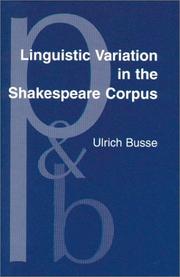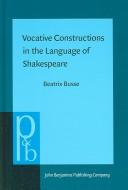| Listing 1 - 10 of 55 | << page >> |
Sort by
|

ISBN: 9027253463 1588112802 9786612160967 1282160966 9027296197 9789027296191 9781588112804 Year: 2002 Publisher: Amsterdam ; Philadelphia : J. Benjamins Pub. Co.,
Abstract | Keywords | Export | Availability | Bookmark
 Loading...
Loading...Choose an application
- Reference Manager
- EndNote
- RefWorks (Direct export to RefWorks)
This study investigates the morpho-syntactic variability of the second person pronouns in the Shakespeare Corpus, seeking to elucidate the factors that underlie their choice. The major part of the work is devoted to analyzing the variation between you and thou, but it also includes chapters that deal with the variation between thy and thine and between ye and you. Methodologically, the study makes use of descriptive statistics, but incorporates both quantitative and qualitative features, drawing in particular on research methods recently developed within the fields of corpus linguistics, socio-historical linguistics and historical pragmatics. By making comparisons to other corpora on Early Modern English the work does not only contribute to Shakespeare studies, but on a broader scale also to language change by providing new and more detailed insights into the mechanisms that have led to a restructuring of the pronoun paradigm in the Early Modern period.
Historical linguistics --- English language --- Grammar --- Shakespeare, William --- LANGUAGE ARTS & DISCIPLINES --- Linguistics / General --- English Literature --- English --- Languages & Literatures --- Germanic languages --- Pronoun --- Variation --- Pronoun. --- Variation. --- Shakespeare, William, --- Language.

ISBN: 9027253935 9789027253934 9786612155253 1282155253 9027293139 9789027293138 Year: 2006 Publisher: Amsterdam ; Philadelphia : John Benjamins Pub. Co.,
Abstract | Keywords | Export | Availability | Bookmark
 Loading...
Loading...Choose an application
- Reference Manager
- EndNote
- RefWorks (Direct export to RefWorks)
English language --- Forms of address in literature. --- Address, Forms of. --- Shakespeare, William, --- Language. --- Grammar --- Shakespeare, William --- 802.0 --- 820 --- 820 Engelse literatuur --- Engelse literatuur --- 802.0 Engels. Engelse taalkunde --- Engels. Engelse taalkunde --- Forms of address in literature --- Germanic languages --- Address, Forms of --- Šekspir, Vil'jam --- Shakespear, William, --- Shakspeare, William, --- Šekʻspiri, Uiliam, --- Saixpēr, Gouilliam, --- Shakspere, William, --- Shikisbīr, Wilyam, --- Szekspir, Wiliam, --- Šekspyras, --- Shekspir, Vilʹi︠a︡m, --- Šekspir, Viljem, --- Tsikinya-chaka, --- Sha-shih-pi-ya, --- Shashibiya, --- Sheḳspir, Ṿilyam, --- Shaḳspir, Ṿilyam, --- Syeiksŭpʻio, --- Shekspir, V. --- Szekspir, William, --- Shakespeare, Guglielmo, --- Shake-speare, William, --- Sha-ō, --- Şekspir, --- Shekspir, Uiliam, --- Shekspir, U. --- Šekspir, Vilijam, --- Ṣēkspiyar, Viliyam, --- Shakspir, --- Shekspyr, Vyli︠e︡m, --- Şekspir, Velyam, --- Ṣēkspiyar, Villiyam, --- Shēkʻspʻiyr, Vlilliam, --- Ṣēkspiyar, --- Ṣēkspiyar Mahākavi, --- Ṣēkspiyar Mahākaviya, --- Sheḳspier, Ṿilyam, --- Shēkʻspir, --- Shakespeare, --- Śeksper, --- Шекспир, Вильям, --- Шекспир, Уильям, --- שייקספיר, וויליאם, --- שייקספיר, וו., --- שיקספיר, וויליאם --- שיקספיר, ויליאם --- שיקספיר, ויליאם, --- שכספיר, ויליאם, --- שכספיר, וילים, --- שכספיר, ו׳ --- שעפקספיר, וויליאם, --- שעקספיער, וויליאם --- שעקספיער, וויליאם, --- שעקספיער, ווילליאם --- שעקספיער, וו., --- שעקספיר --- שעקספיר, וו --- שעקספיר, וויליאם, --- שעקספיר, וויליאמ --- שעקספיר, ווילליאם --- שעקספיר, ווילליאם, --- שעקספיר, וו., --- שעקספיר, װיליאם, --- שעקספיר, װילליאם, --- שעקספיר, װ., --- שעקספער --- שעקספער, וויליאמ --- שקספיר --- שקספיר, וו --- שקספיר, וויליאם --- שקספיר, וויליאם, --- שקספיר, ווילים, --- שקספיר, וילאם --- שקספיר, ויליאם --- שקספיר, ויליאם, --- שקספיר, ויליים, --- שקספיר, וילים --- שקספיר, וילים, --- شاكسبير، وليم --- شاكسپير، وليم --- شكسبير، وليام --- شكسبير، وليم --- شكسبير، وليم، --- شكسبير، و. --- شكسپير، وليم --- شكسپير، ويليام --- شيكسبير، وليام --- شيكسبير، وليام.، --- شيكسبير، وليم --- شکسبير، وليم --- وليم شکسبير --- 沙士北亞威廉姆, --- 沙士比亞威廉姆, --- 莎士比亞威廉姆, --- 莎士比亞威廉, --- 莎士比亞, --- 820 English literature. Literature in English --- English literature. Literature in English
Book
ISSN: 1255183X ISBN: 9782859446239 2859446230 2859448098 Year: 2009 Volume: 26 Publisher: Paris: Publications de la Sorbonne,
Abstract | Keywords | Export | Availability | Bookmark
 Loading...
Loading...Choose an application
- Reference Manager
- EndNote
- RefWorks (Direct export to RefWorks)
Ni philosophe du sujet ni philosophe du moi, Spinoza, on le sait, n'accorde pas à l'homme le statut de substance, mais de mode. Cette désubstantialisation s'accompagne d'une apparente indifférence à l'égard du problème classique de la différence spécifique de l'homme par rapport à l'animal. Dès lors on peut s'interroger sur l'étrange silence de l'Éthique au sujet d'une définition précise de l'essence humaine. À rebours des commentateurs qui ont essayé de reconstituer cette définition à partir des indications de l'auteur, Julien Busse cherche de manière originale à comprendre les raisons pour lesquelles Spinoza n'a pas jugé bon d'en fournir une. Plutôt que la présence, il pense l'absence de définition de l'essence humaine pour montrer qu'elle ne tient pas à une carence, mais qu'elle obéit à une impossibilité. C'est sur la nécessité de l'absence d'une telle définition que Julien Busse invite à se pencher pour en analyser aussi bien les causes que les effets.
Humanity. --- Humanité (Morale) --- Spinoza, Benedictus de, --- Criticism and interpretation. --- Humanité (Morale) --- Humanity --- Philosophy & Religion --- Philosophy --- philosophie --- interprétation --- critique --- humanité
Book
ISBN: 3885326590 Year: 1994 Publisher: München Verlag für Deutsch
Abstract | Keywords | Export | Availability | Bookmark
 Loading...
Loading...Choose an application
- Reference Manager
- EndNote
- RefWorks (Direct export to RefWorks)
485.2 --- Duits --- Handboek/cursus --- Grammatica --- handboek --- Taal en letterkunde overige talen --- (zie ook: zinsontleding) --- Schoolbooks - Didactic material --- Grammar --- German language --- Taal en letterkunde; overige talen
Book
ISBN: 9783319274287 Year: 2016 Publisher: Cham : Springer International Publishing : Imprint: Springer,
Abstract | Keywords | Export | Availability | Bookmark
 Loading...
Loading...Choose an application
- Reference Manager
- EndNote
- RefWorks (Direct export to RefWorks)
This text outlines, from a surgeon's standpoint, how wounds can be expeditiously and effectively managed in the Urgent Care setting by physicians and mid-level providers with Primary Care training. The main topics addressed include the principles of wound healing, wound types, types of primary repair, healing by secondary intention, wound complications, and special circumstances. Under each of these subheadings, proper evaluation of the wound, techniques to facilitate healing, specific patient home care (aftercare) instructions, and pitfalls to be avoided are addressed. In addition, a brief list of specific do's and don'ts for each type of wound and tips for effective transfer of care when necessary is included. This text provides a concise reference manual that can be used to provide quick yet structured information to improve patient outcomes. As Urgent Care is a clinical setting that is growing in popularity across the United States, Wound Management in Urgent Care will provide a useful resource for providers in the Urgent Care setting.
Nursing --- Orthopaedics. Traumatology. Plastic surgery --- Surgery --- Human medicine --- geneeskunde --- spoedgevallen --- intensieve zorgen --- chirurgie --- EHBO (eerste hulp bij ongelukken) --- verpleegkunde --- intensieve-zorgen afdeling --- Critical care medicine. --- Surgery. --- Emergency medicine. --- Nursing. --- Intensive / Critical Care Medicine. --- General Surgery. --- Primary Care Medicine. --- Medicine, Emergency --- Medicine --- Critical care medicine --- Disaster medicine --- Medical emergencies --- Surgery, Primitive --- Clinical nursing --- Nurses and nursing --- Nursing process --- Care of the sick --- Intensive care --- Intensive medicine --- Emergency medicine --- Intensive care units --- Primary care (Medicine). --- Primary medical care --- Medical care
Book
Year: 2008 Publisher: Göttingen : Universitätsverlag Göttingen,
Abstract | Keywords | Export | Availability | Bookmark
 Loading...
Loading...Choose an application
- Reference Manager
- EndNote
- RefWorks (Direct export to RefWorks)
"Der Erste Weltkrieg wirkte auf vielen unterschiedlichen Ebenen auf die Institution Universität ein. Mit Beginn des Wintersemesters 1914/15 hatten sich in Göttingen wie an allen europäischen Hochschulen die Hörsäle geleert. Die wenigen Studierenden, die nicht als Kriegsfreiwillige angenommen worden waren, jagten nun gemeinsam mit der Bevölkerung Spione, wozu sie auch ihre ausländischen Kommilitonen zählten. Die Institute der aufstrebenden naturwissenschaftlichen Fächer mussten mit massiven wirtschaftlichen und personellen Schwierigkeiten kämpfen. Sie konnten keineswegs vom militärischen Interesse an naturwissenschaftlicher Forschung profitieren, da die Militärbehörden sich bewusst nur außeruniversitärer Forschungseinrichtungen, wie der Modellversuchsanstalt Ludwig Prandtls, bedienten. Göttinger Professoren nahmen am schnell aufflammenden internationalen Propagandakrieg teil. Zeitgleich kam es im Innern der Universität zu mit großem Ernst geführten Auseinandersetzungen. Angesichts dieser Rahmenbedingungen überrascht es, dass es den Professoren der Georgia Augusta weitgehend gelang, das Bild einer funktionierenden Universität zu wahren."
Book
Year: 2008 Publisher: Göttingen : Universitätsverlag Göttingen,
Abstract | Keywords | Export | Availability | Bookmark
 Loading...
Loading...Choose an application
- Reference Manager
- EndNote
- RefWorks (Direct export to RefWorks)
The First World War affected the university as an institution on many different levels. At the beginning of the winter semester of 1914/15, the lecture halls in Göttingen, as at all European universities, had emptied. The few students who had not been accepted as volunteers for war now hunted spies together with the population, including their fellow foreigners. The institutes of the emerging scientific subjects had to face massive economic and personnel difficulties. They were in no way able to benefit from the military interest in scientific research, since the military authorities deliberately only used non-university research institutions, such as the Ludwig Prandtls model testing institute. Professors from Göttingen took part in the rapidly flaming international propaganda war. At the same time there were serious debates inside the university. Given these conditions, it is surprising that the professors at Georgia Augusta have largely managed to maintain the image of a functioning university.
Book
Year: 2008 Publisher: Göttingen : Universitätsverlag Göttingen,
Abstract | Keywords | Export | Availability | Bookmark
 Loading...
Loading...Choose an application
- Reference Manager
- EndNote
- RefWorks (Direct export to RefWorks)
Can early criminal defense helping to avoid or shorten detention? When early criminal defense means to avoid unnecessary detention which burdens both the involved parties, the enforcement and detention and in terms of costs, the state in unnecessary ways? These questions are discussed in the present investigation. It represents the concept and the results of the accompanying scientific research from a 1998 pilot project carried out in the JVA Hannover. It relies on the analysis of over 1,300 criminal acts and the Federal Central Register's (Bundeszentralregister) statements, the evaluation of the detention list of the local court of Hanover and on extensive interviews with people involved in the project (defence lawyers, prosecutors, judges, court clerks and remand prisoners). The empirical findings of the accompanying be embedded in a legal framework and criminological conclusions are presented.
Book
Year: 2008 Publisher: Göttingen : Universitätsverlag Göttingen,
Abstract | Keywords | Export | Availability | Bookmark
 Loading...
Loading...Choose an application
- Reference Manager
- EndNote
- RefWorks (Direct export to RefWorks)
Can early criminal defense helping to avoid or shorten detention? When early criminal defense means to avoid unnecessary detention which burdens both the involved parties, the enforcement and detention and in terms of costs, the state in unnecessary ways? These questions are discussed in the present investigation. It represents the concept and the results of the accompanying scientific research from a 1998 pilot project carried out in the JVA Hannover. It relies on the analysis of over 1,300 criminal acts and the Federal Central Register's (Bundeszentralregister) statements, the evaluation of the detention list of the local court of Hanover and on extensive interviews with people involved in the project (defence lawyers, prosecutors, judges, court clerks and remand prisoners). The empirical findings of the accompanying be embedded in a legal framework and criminological conclusions are presented.
Criminal procedure --- Criminal law --- Defense (Criminal procedure)
Book
Year: 2024 Publisher: De Gruyter
Abstract | Keywords | Export | Availability | Bookmark
 Loading...
Loading...Choose an application
- Reference Manager
- EndNote
- RefWorks (Direct export to RefWorks)
| Listing 1 - 10 of 55 | << page >> |
Sort by
|

 Search
Search Feedback
Feedback About UniCat
About UniCat  Help
Help News
News